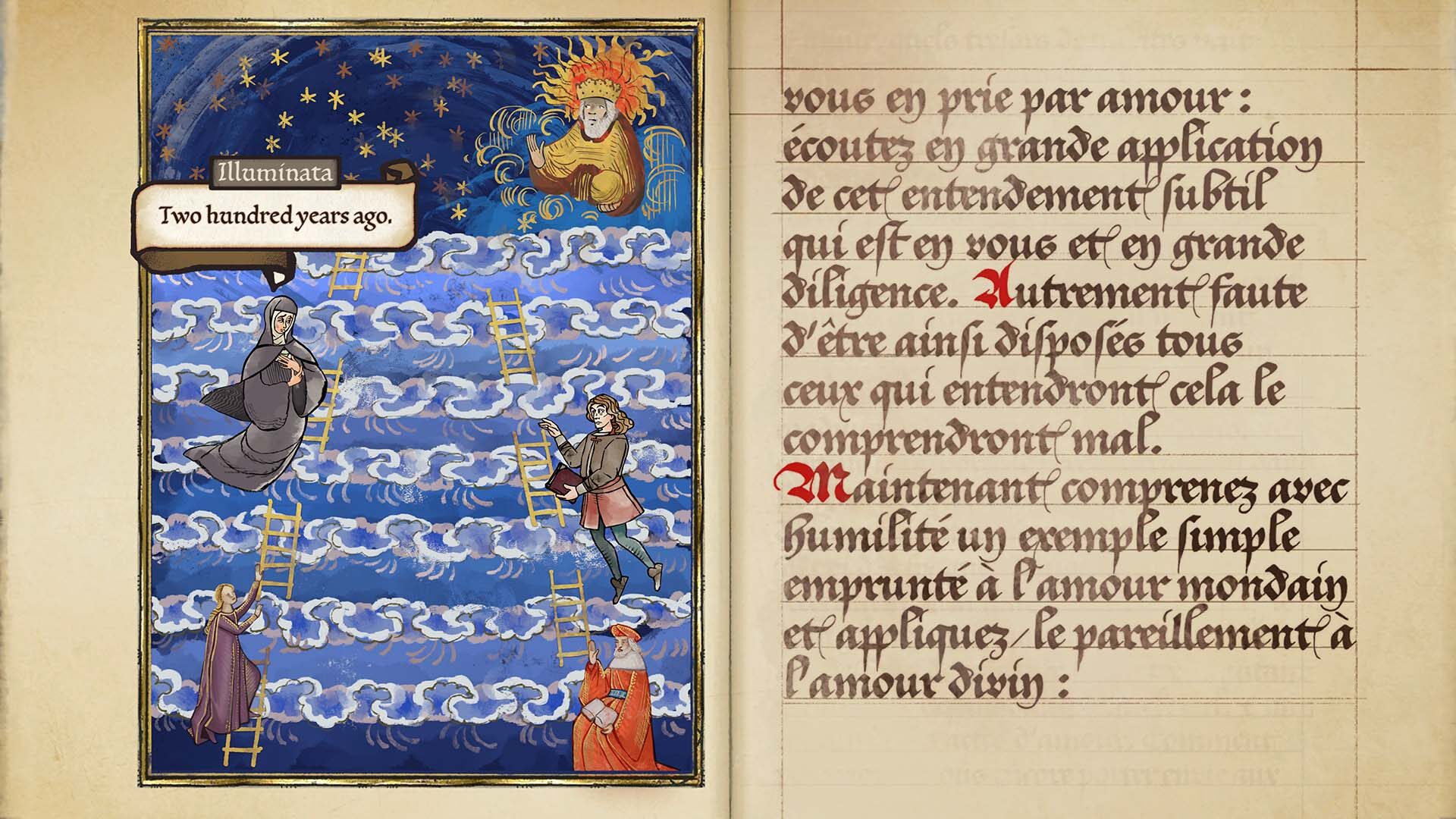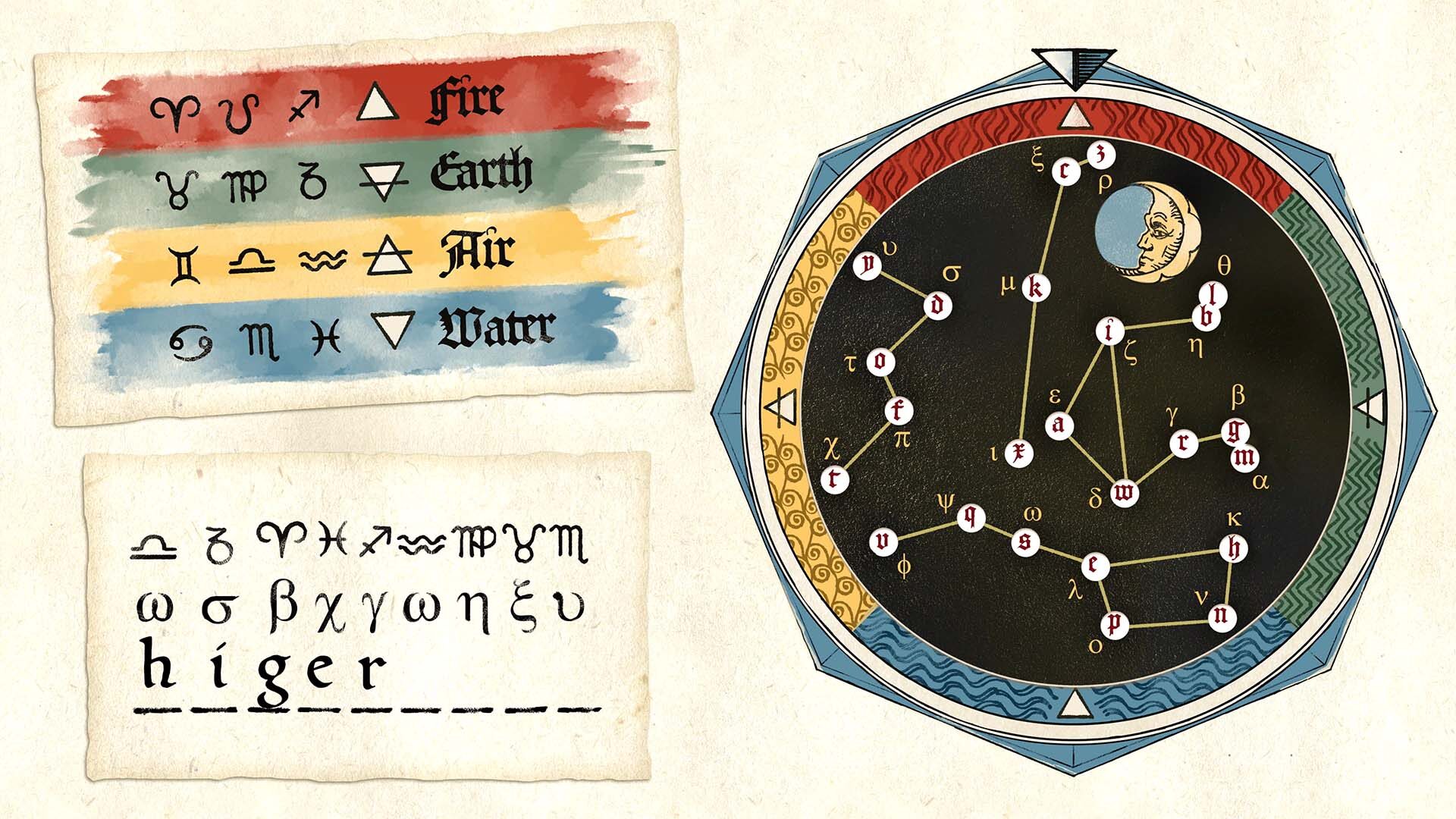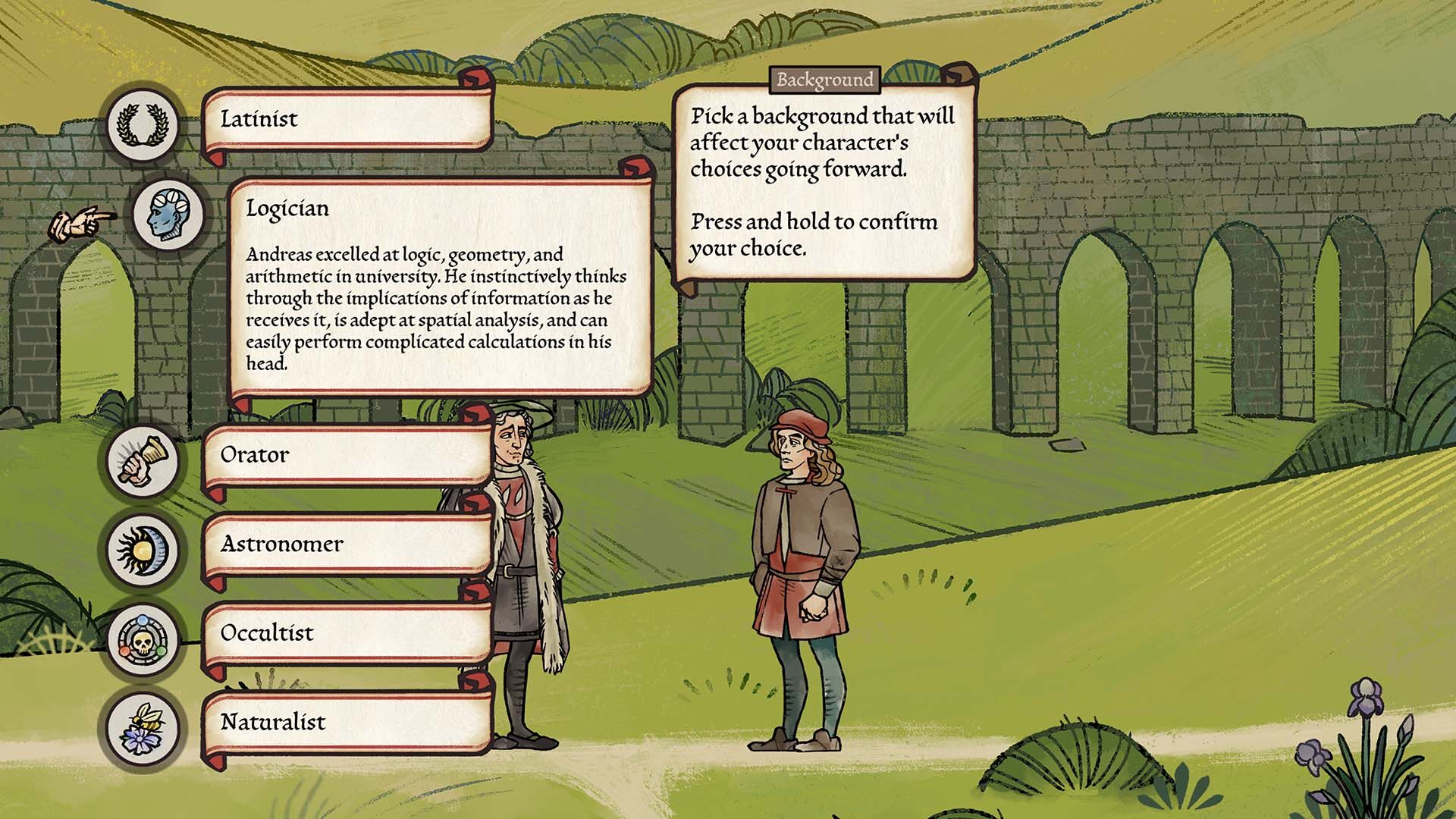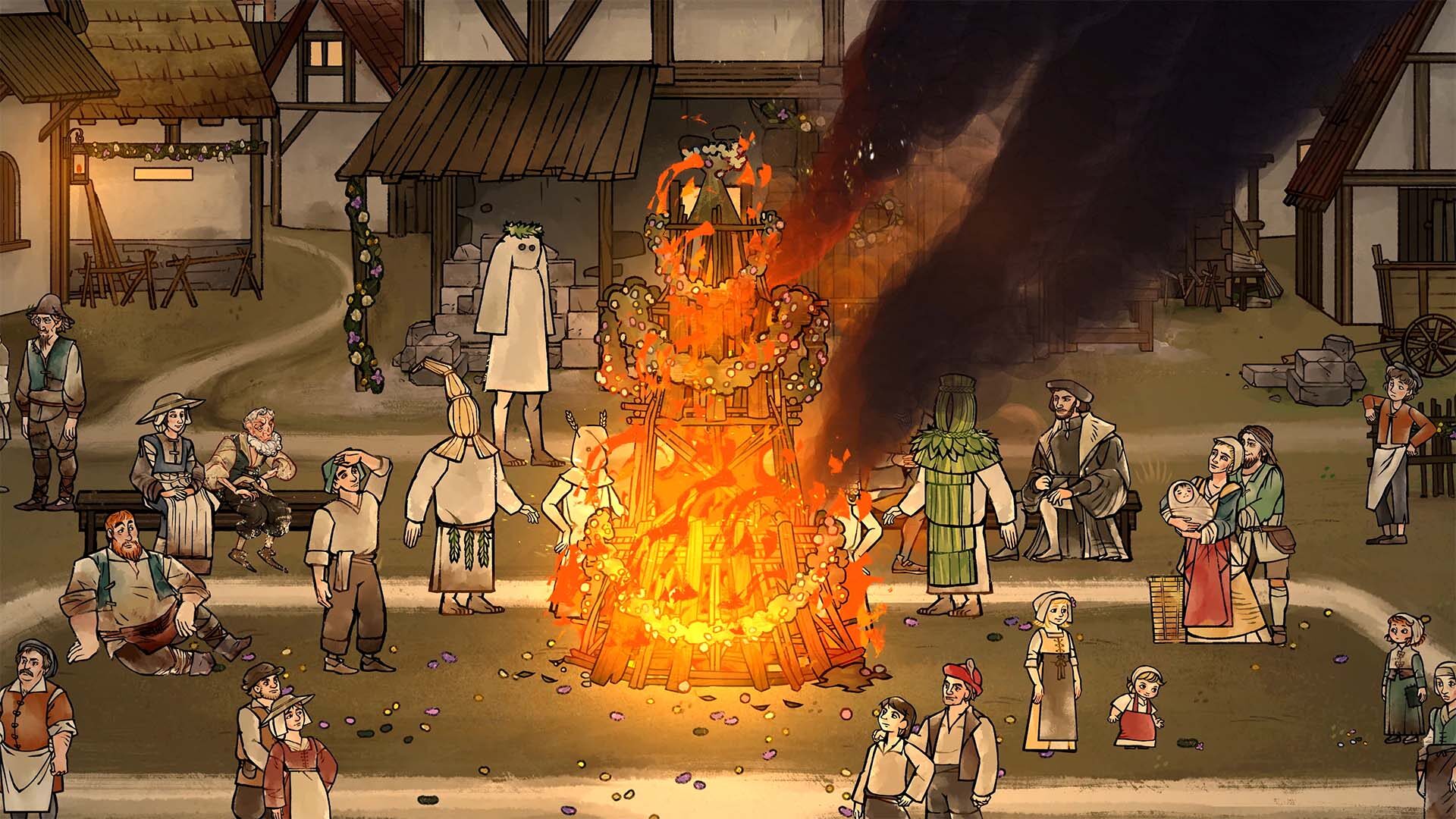In Obsidian Entertainment’s Pentiment, you play as Andreas Maler, an artist from Nuremberg who has taken a temporary job at Kiersau Abbey near the town of Tassing. As it is 1518, Adreas’ job at the abbey’s scriptorium is to copy manuscripts with speed and precision (when not working on his own masterpiece). With Gutenberg’s printing press a relatively recent invention, the artistry of copying manuscripts is rapidly becoming obsolete—meaning that pretty soon, Kiersau will lose its only real means of income.
That’s why the visit of a local baron—who is checking on the status of the manuscript he ordered from the abbey—is so tense, and why his displeasure with the work of Brother Piero, the aging monk assigned to his manuscript, is so pressing. But when the baron is murdered in the abbey’s halls, and Piero (a friend of Andreas) is found kneeling next to the body, clutching a bloodied knife, Andreas takes it upon himself to solve the murder to save his friend from facing execution for a crime he didn’t commit.
One of the layers in Pentiment—a game literally named after a kind of layering—is how you and Andreas are both outsiders to its world. Sure, Andreas might not be as much of an outsider, considering he’s familiar with the basic social norms of early 16th century Bavaria, but he’s certainly an outsider in the eyes of Kiersau’s abbot. And, as he’s a city boy from Nuremberg, the people of Tassing see him (though more favorably) as an outsider, too. The 21st century player, especially those of a secular variety, will feel like even more of an outsider at first.
That’s why a murder investigation is such a clever entry point to the time period and its customs (as it was for Umberto Eco’s The Name of the Rose, a “huge inspiration for Pentiment,” according to game director Josh Sawyer). As you walk around Tassing and Kiersau, questioning the villagers and the friars, the peasants and the priests, you discover who these people are, or who they want you to think they are. They tell you their stories, their backgrounds, and their beliefs. You break bread with them, eat their pottage and their fish, listen to their gossip or their tales of woe, and you begin to deeply care about them. Playing through Pentiment, you pick up on turns of phrase. “God bless you,” becomes a common and meaningful welcome, not just a weird holdover phrase reserved for when snot explodes out of someone’s nose. “Until later,” they say. “Until then,” you say back.

A notable accomplishment of Pentiment’s, rare among historically set video games, is how it gives you the feel of the real personality of its era. As much as its entire foundation is based on its historical settings, Assassin’s Creed games always struggle with the believability of their settings, if not their intrigue and plot-driven storytelling. Hollywood movies, too, end up feeling less like an authentic recreation of a time period and more like hot people in wigs. Though it had all the power of Fallout: New Vegas and The Outer Worlds studio Obsidian Entertainment behind it, Pentiment finds success in taking a much smaller, more stylistic approach to how it portrays 16th century Bavaria by using an art style that harks back to the limitations of that time, an aesthetic trapped between illustrations and woodcuts. That Pentiment’s art style is in itself symbolic of the tumult of that period speaks to how thoroughly considered a game it is.
Why does it work so well? For one, it enacts what I like to refer to as the As Dusk Falls principle (or just the principle that guided non-visual fiction writing for centuries), which states that there’s no better tool of immersion than a person’s own imagination. Stiffly animated but richly written cartoon characters leave just enough gaps so that my own mind can fill in the blanks to bring 1518 to life. That there’s no distracting voice acting and instead each character speaks in a font that’s meant to represent their station in life, and that this font changes depending on what Andreas learns about them, only adds to this effect.

But the other reason Pentiment’s art style is so effective is because it reflects how we actually experience history. Unless you’re a trained and educated professional who can unearth, understand, translate, and contextualize first-hand, written historical accounts, the closest you can get to experiencing an historical period is looking at the artwork that was created in that era and seeing how people who lived it viewed it. Pentiment mimics that feeling of staring at a 16th century illustration and letting it transport you to that era. In other words, it mimics our own experience with history. That the residents of Tassing and Kiersau are also coming to terms with and confronting history in a similar way is just another example of that delicious layering I mentioned earlier.
Pentiment is a true work of art; it’s a deeply thoughtful and fully realized meditation on the passage of time, history’s impact on the present, political power and control, social construction and its relationship to the individual, and much more, all wrapped up and presented in the digestible package of an historical mystery thriller. To complain about its gameplay seems like a rudimentary use of this critical space, but I do wish Obsidian’s designers pushed that aspect of the game a little bit further.

Pentiment has all the makings of an adventure RPG, but that’s not really what it is. Sure, you make choices in dialogue and pick a background for your character that impacts those choices, but that’s as far as its RPG elements go. It also really isn’t much of an adventure game in the traditional sense, though you will find objects that can help you solve puzzles. Really, the impact you have as a player on the game’s story materializes in the details of the story but not its overall shape or conclusion. There are some smaller annoyances, too, a few tiny hiccups in the narrative design, where some dialogue will seem slightly out of order depending on which characters you talk to when, and that could be a side effect of the game’s overall structural rigidity. This might leave some players feeling slightly deflated, maybe even a little impotent, in the face of Tassing’s ultimate immovability, but if you focus on the little things, you will see that your decisions have an impact on individuals. Even that feels like a purposeful metaphor.
Pentiment is the kind of game that makes me hate having to give review scores. I can’t really summarize just how much of an effect the game had on me, especially not in a certain number of stars. Likewise, the kinds of things it does as a game seem lesser compared to similar titles, but only in a mechanical sense. In fact, the story that Pentiment tells could not be told as effectively if it wasn’t a game, and it’s a story that I’ve been thinking about every day since I started playing it. Is it technically the “best” game I’ve ever played? No, but it’s my favorite game I’ve played this year—maybe one of my favorite games of all time—and one to which I hope that history will be very kind.

Images: Xbox Game Studios
|
★★★★★
Pentiment is a true achievement of marrying story, style, and theme into a magical and cohesive whole. In lieu of 3D graphics that try too hard and still fail to represent an authentic-feeling world, Obsidian’s artists opted for a more illustrative aesthetic to tell their gripping story of a murder in an abbey, a choice that resonates throughout the entire game. While it might not satisfy every player, especially those expecting a more traditional RPG or adventure experience, those who can immerse themselves in Pentiment’s vision of 16th century Bavaria will find one of the best games of the year. |
Developer Obsidian Entertainment Publisher Xbox Game Studios ESRB M - Mature Release Date 11.15.2022 |
| Pentiment is available on Xbox Series X/S, Xbox One, and PC. Primary version played was for Xbox Series X/S. Product was provided by Xbox Game Studios for the benefit of this coverage. EGM reviews on a scale of one to five stars. | |

Michael Goroff has written and edited for EGM since 2017. You can follow him on Twitter @gogogoroff.